Implementation of the NDC Partnership Gender Strategy: Trends in Countries’ Gender Requests

Gender equality is one of the NDC Partnership’s guiding principles as it supports equitable country-driven climate action. The Partnership’s Gender Strategy (see launch blog) defines the process to support countries in mainstreaming gender equality into climate action and lays the foundation to develop and implement gender-responsive NDCs.
Since the launch of the NDC Partnership Gender Strategy in September 2019, the Partnership has worked to advance the strategy’s implementation by integrating minimum gender standards in country engagement processes and sharing global knowledge and best practices on gender mainstreaming in climate action (see infographic here).
The NDC Partnership currently facilitates support to countries to advance gender equality in Sub-Saharan Africa, Asia and the Pacific, Latin America and the Caribbean, and the Middle East and North Africa regions. A total of 146 gender-related requests have been received by the Partnership from governments of Burkina Faso, Dominican Republic, Grenada, Jordan, Mali, Mongolia, Morocco, Mozambique, Namibia, Republic of the Marshall Islands, Saint Lucia, and Uganda.
This blog provides an insight on the types of gender requests submitted to the Partnership as well as the progress made in supporting these requests. For this analysis, completed in April 2020, 17 Partnership Plans—or NDC implementation plans—developed by countries through their engagement with the Partnership were reviewed. Twelve of these 17 NDC implementation plans included specific gender-related requests (i.e. those including explicit references to gender, sex, women, and/or men) and key gender trends identified in the data for these 12 countries is presented below.
Requests by Gender Support Area and by Region
The nature of gender support requests from countries are wide and varied but can be grouped into six main categories of support, as outlined in Table 1. These categories mirror key areas for gender mainstreaming in the program cycle, from informing program design through data, analysis, and stakeholder consultation, to developing risk mitigation strategies and tracking progress via monitoring and evaluation.
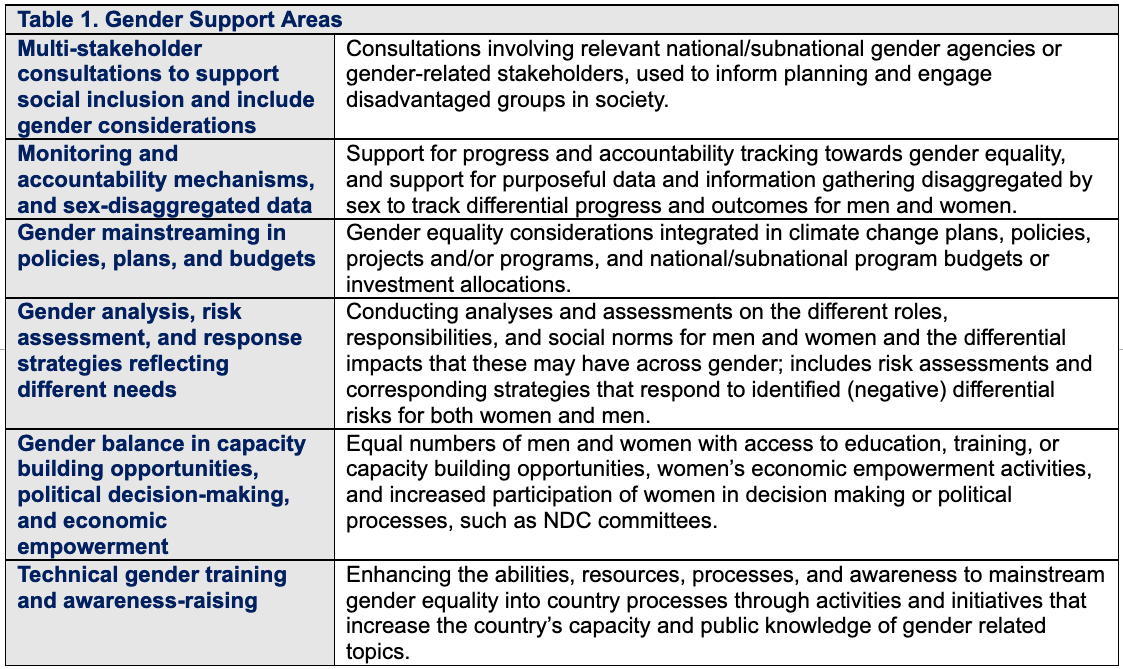
Below, Figure 1 highlights requests received by the Partnership per gender support area, with total requests reflected in grey, and requests that are supported by partners (confirmed or pipeline support) or led by the government in blue. The difference between these two columns reflects the remaining unsupported requests.
Gender mainstreaming into climate policies, plans, and budgets is currently the most requested gender support area, closely followed by actions to increase gender balance in opportunities related to capacity building, decision making, and economic empowerment. Although support for multi-stakeholder consultations related to gender is least requested in NDC implementation plans, this is encouraged through the Gender Strategy at an earlier stage, when countries are preparing their implementation plans. A natural progression from process-related requests, such as stakeholder consultations, to more technical needs (i.e. gender mainstreaming in policies, technical training, and setting up monitoring mechanisms) related to gender as part of the country’s climate action agenda is generally anticipated.
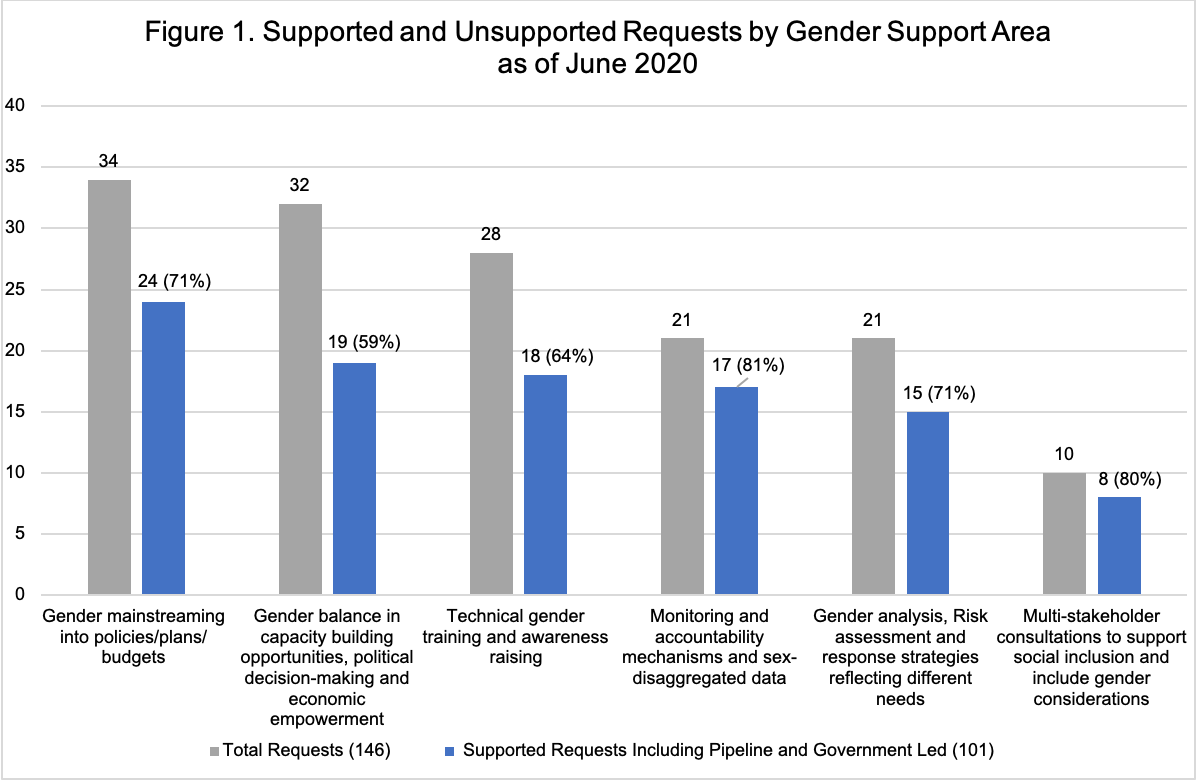
The distribution of types of requests for gender support varies widely by region. Specifically, in the LAC and MENA regions, most of the requests (around 60 percent) relate to gender balance in capacity building opportunities, political decision-making, and economic empowerment. However, in Sub-Saharan Africa and Asia and the Pacific, the distribution of gender requests across the various gender support areas is more varied.
Requests by Focus Area and Sector
Most gender request areas are cross-cutting in nature and relate to both adaptation and mitigation. Countries’ requests for gender support are categorized by the sectors outlined in Figure 2 below. Of the requests that are sector-specific, most common are gender requests in the agriculture, forestry and other land use (15 percent), water (8 percent), and transport (8 percent) sectors.
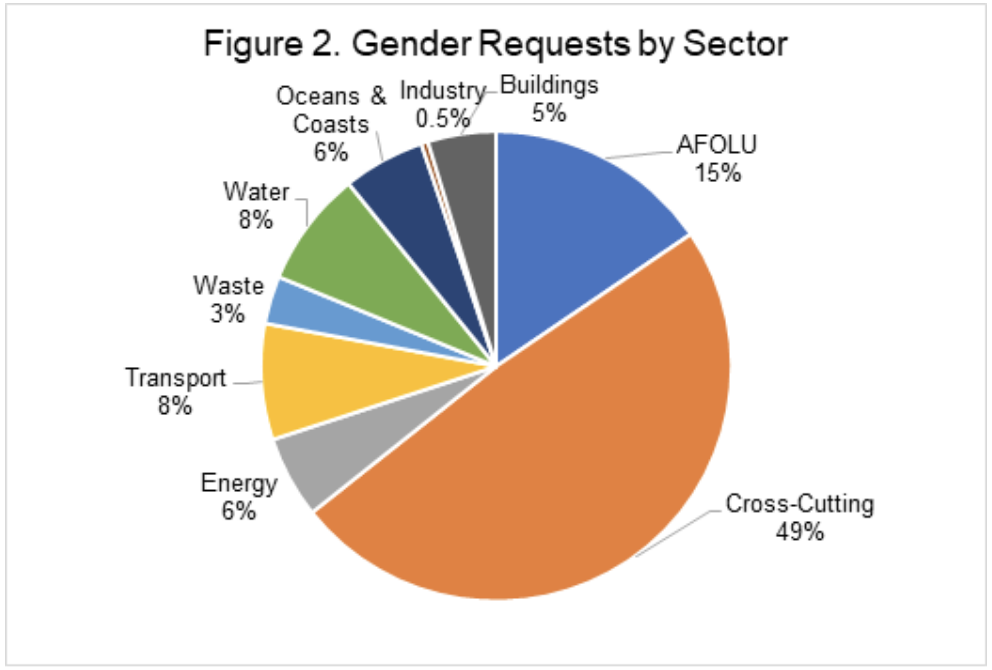
Partner Support
Many Partnership members have been responsive to countries’ gender mainstreaming requests, with a total of 34 partners providing a wide range of support. Many partners also coordinate to provide gender support at the country level. For example, Namibia is working towards strengthening institutional capacity and coordination to deliver and increase NDC commitments, including enhanced capacity of national advisors to formulate climate change and gender indicators into sector strategies and national development plans. In response, AFD, EU, and WRI are supporting integration of climate change and gender indicators in National Development Plans, as well as trainings on formulation of climate change and gender indicators, data management, and reporting.
Most support on gender in Partnership Plans is currently being provided by UNDP, Germany/GIZ, WRI, AfDB, FAO, and Sweden, as well as many other partners as highlighted in Figure 3. Notably, several partners that are currently not members of the NDC Partnership are providing gender support in Partnership Plans as well, such as the 2050 Pathways Platform and UN Women.
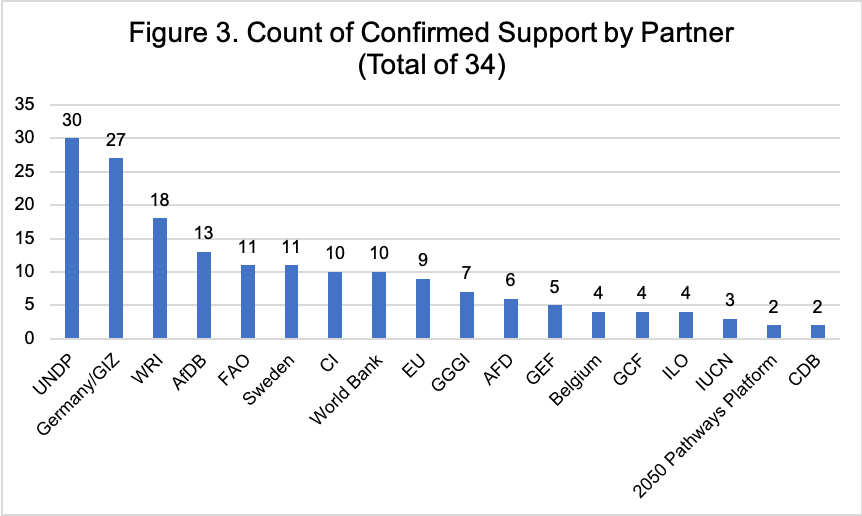
Supporting Unmet Country Gender Needs
While member countries are increasingly requesting support for gender-responsive NDC implementation, about a third of these requests remain unsupported and require further technical and financial assistance from partners. Of the 45 unsupported requests, 30 stem from countries in Africa and 14 have been requested from countries in Asia and the Pacific. Thirty percent of unsupported requests are related to the support area that focuses on gender balance in capacity building opportunities, political decision-making, and economic empowerment.
Table 2 highlights examples of unsupported requests, the rest of which can be found here.
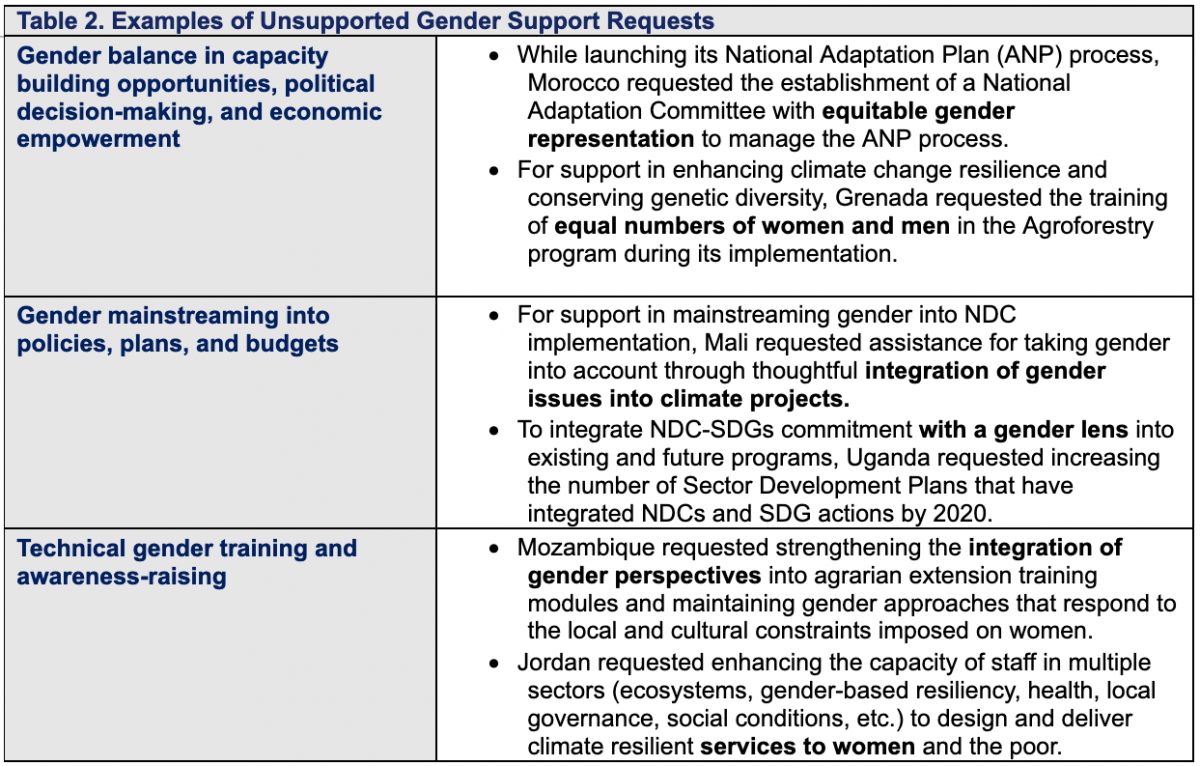
To achieve more gender-equal climate outcomes, member countries are increasingly requesting support to ensure that NDCs respond to gender concerns and needs. Implementing and development partners are responding similarly with technical and financial assistance and are encouraged to increase engagement in supporting gender mainstreaming from the early stages of the NDC Partnership country engagement process. As countries strive to strengthen gender equality in climate action, the Partnership will continue to share effective gender mainstreaming practices in the NDC processes and help channel available partner resources to meet country needs. For more information on how the NDC Partnership is facilitating gender mainstreaming into NDC planning and implementation, find here the latest Insight Brief on ‘Gender and the NDCs’.
This blog was written by Dena Kleemeier and Kasonde Chisaka with the support of Ralien Bekkers and Lisa Bow of the NDC Partnership Support Unit.
